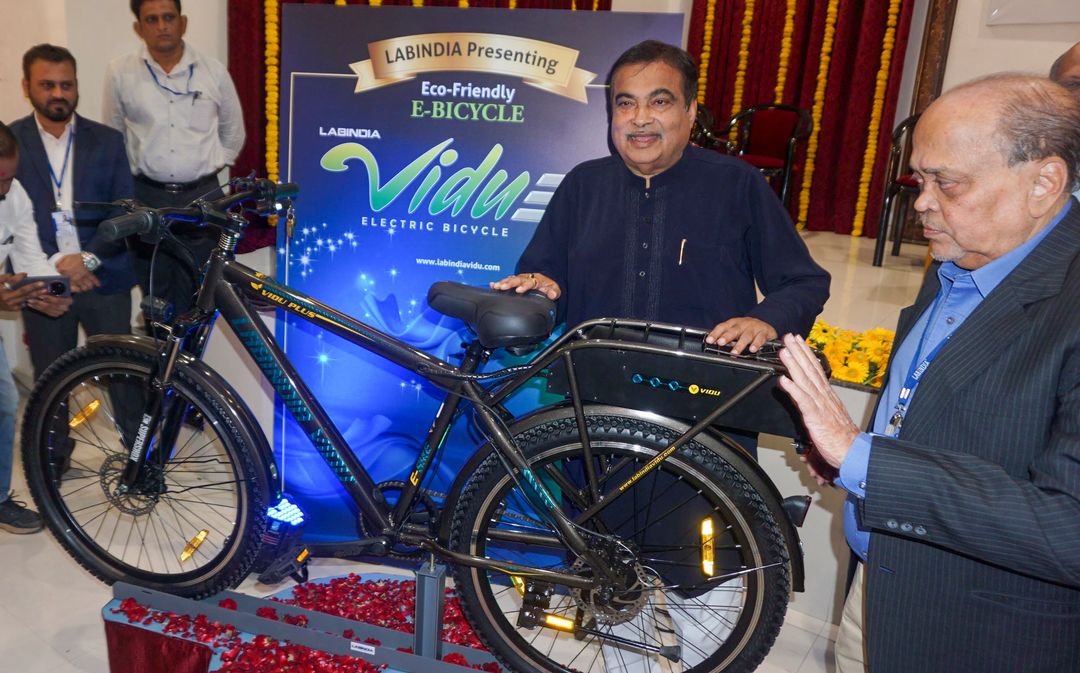
Union Minister Highlights India's Shift Towards Sustainable Transport and Green Energy Solutions
Mumbai/Thane, April 1 – Union Minister for Road Transport and Highways, Nitin Gadkari, said on Monday that a significant reduction in lithium battery costs will substantially lower electric vehicle (EV) prices, making them more accessible to the Indian masses.Addressing an event marking the launch of an eco-friendly electric cycle in Thane, Gadkari emphasized the urgent need for India to transition from fossil fuels to sustainable energy sources, citing pollution as the nation's greatest challenge.
Affordable Lithium Batteries Boost EV Adoption
Minister Gadkari highlighted that lithium battery prices have dropped sharply from USD 150 per kilowatt-hour (kWh) to around USD 100 per kWh. This decline has notably narrowed the cost difference between electric vehicles and traditional fuel-powered automobiles, making EVs increasingly competitive."The price of lithium, which was USD 150 per kilowatt a few years ago, has now come down to nearly USD 100. Once it decreases further, the cost of electric vehicles will come down as well, making them more affordable for the masses," Gadkari said.
He further stated that ongoing research in battery technology—including lithium-ion, zinc-ion, sodium-ion, aluminium-ion, and semiconductors—is crucial for India's push towards eco-friendly and economical transport solutions.
India to Lead Global Electric Vehicle Market by 2030
Gadkari expressed confidence in India's ability to become a global leader in EV production by 2030, driven by rapid advancements in battery technology and the growing international demand for Indian-made electric two-wheelers.Currently, 50% of India's two-wheelers are exported, surpassing domestic sales revenues, highlighting a significant economic opportunity for India. "We are gaining more from exports than the domestic market," he stated, referring to his recent inauguration of a Hero manufacturing plant in Ludhiana, Punjab.
Promoting Sustainable Transport and Cycling
The Union Minister underscored cycling as a viable and eco-friendly transport solution amid growing urbanization. He advocated for dedicated cycling infrastructure to promote road safety, reduce congestion, and foster sustainable urban mobility."With increasing urbanization, dedicated cycling infrastructure is needed to encourage environmentally friendly travel while improving road safety and decongesting cities," Gadkari emphasized.
Biofuels: Transforming Farmers into Energy Providers
Highlighting biofuels as another pivotal area for India's green transition, Gadkari stressed the importance of converting agricultural waste into biofuels like bio-CNG and bio-aviation fuel. This transformation would enhance rural incomes, curb pollution, and significantly cut fuel import expenses, estimated at Rs 22 lakh crore annually."Farmers will no longer be just food providers—they will be energy providers too," he stated.
Notably, Gadkari cited the government's efforts in converting rice straw into biofuel, addressing the issue of crop residue burning in Haryana that contributes to air pollution. Currently, 400 biofuel projects are underway, with 60 already operational.
India’s Sustainable Energy Commitment
Emphasizing India's strategic approach towards sustainable energy, Gadkari outlined the government's vision for "import substitute, cost-effective, pollution-free, and indigenous" solutions. He expressed optimism regarding India's global competitiveness, boosted by innovations such as Tata's hydrogen cell-operated trucks and the nation's rising engineering and agricultural capabilities.Recalling earlier skepticism towards electric vehicles, Gadkari remarked, "When I spoke about electric cars and e-bikes in the past, people did not believe me." However, recent advancements have validated India's potential to pioneer green mobility technologies on the global stage.
"With a strong push for electric vehicles, biofuels, and urban cycling infrastructure, India is poised to lead the global transition to sustainable transport solutions," he concluded.